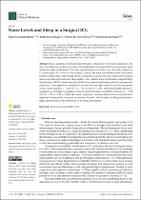Noise Levels and Sleep in a Surgical ICU
Author
Date
2022-04-22Permanent link
https://hdl.handle.net/11351/8110DOI
10.3390/jcm11092328
ISSN
2077-0383
WOS
000795301600001
PMID
35566455
Abstract
Sleep is disturbed in critically ill patients and is a frequently overlooked complication. The aim of our study is to evaluate the impact of sound levels in our surgical ICU on our patients’ sleep on the first night of admission. The study was performed in a tertiary care university hospital, in a 12-bed surgical ICU. Over a 6-week period, a total of 148 adult, non-intubated and non-sedated patients completed the study. During this six-week period, sound levels were continuously measured using a type II sound level meter. Sleep quality was evaluated using the Richards–Campbell Sleep Questionnaire (RCSQ), which was completed both by patients and nurses on the first morning after admission. A non-significant correlation was found between night sound levels and sleep quality in the overall sample (r = −1.83, 95% CI; −4.54 to 0.88, p = 0.19). After multivariable analysis, a correlation was found between higher sound levels at night and lower RCSQ evaluations (r = −3.92, 95% CI; −7.57 to −0.27, p = 0.04). We found a significant correlation between lower sound levels at night and a better quality of sleep in our patients; for each 1 dBA increase in LAFeq sound levels at night, patients scored 3.92 points lower on the sleep questionnaire.
Keywords
Noise; Perioperative care; SleepBibliographic citation
Guisasola-Rabes M, Solà-Enriquez B, Vélez-Pereira AM, de Nadal M. Noise Levels and Sleep in a Surgical ICU. J Clin Med. 2022 Apr 22;11(9):2328.
Audience
Professionals
This item appears in following collections
- HVH - Articles científics [4476]
The following license files are associated with this item:

 Private area
Private area Contact Us
Contact Us







